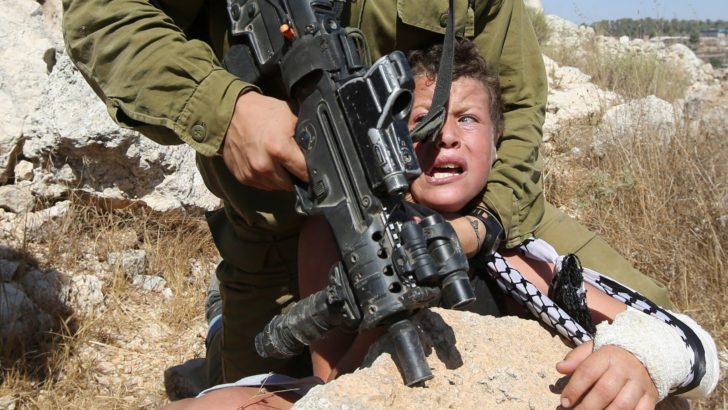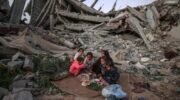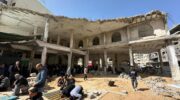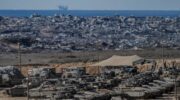PHOTO: Israeli soldier with 11-year-old Palestinian boy, August 28, 1015 – CNN.
RAMALLAH (Ma’an) — Israeli authorities have detained approximately one million Palestinians since the establishment of the state of Israel in 1948 and the subsequent occupation of the West Bank, including East Jerusalem, and the Gaza Strip in 1967, according to a joint statement released Saturday by the Palestinian Committee of Prisoners’ Affairs, the Palestinian Prisoner’s Society (PPS), and the Palestinian Central Bureau of Statistics (PCBS).
“The question of Palestinian prisoners is central for the Palestinian cause,” the statement affirmed, two days before Palestinians mark Palestinian Prisoners’ Day on April 17.
The groups said that Israeli forces detained hundreds of thousands of Palestinians during the first and second intifadas, which they referred to as one of the “most difficult historical stages” of Palestine.
During the First Intifada, which lasted from Dec. 1987 until the Madrid Conference in 1991 aimed at reviving the Israeli-Palestinian peace process, scores of Palestinians were detained by Israeli forces as a result of the largely nonviolent uprising which relied on various campaigns of civil disobedience.
In 2000, the Second Intifada broke out — known as the Al-Aqsa Intifada — after then Israeli Prime Minister Ariel Sharon entered the Al-Aqsa Mosque compound in an act of provocation, causing heavy clashes to break out between Palestinians and Israeli forces, which developed into a full-scale uprising.
According to the joint statement, by the time the uprising ended in 2005, Israeli authorities detained some 100,000 Palestinians, including 15,000 minors and 1,500 women, and 70 Palestinian lawmakers and former ministers.
In addition, Israeli authorities issued some 27,000 administrative detention orders against Palestinians at the time — an Israeli policy of detention without charge or trial almost exclusively used against Palestinians, the statement read.
The statement added that since October 2015, when a wave of political unrest erupted across the occupied Palestinian territory and Israel in what many locals refer to as the “Al-Quds (Jerusalem) Intifada,” some 10,000 Palestinians have been detained by Israeli forces, the majority of whom were from occupied East Jerusalem.
About one third of the Palestinian detainees since 2015 were children and teenagers, the statement said. According to Palestinian prisoners’ rights group Addameer, 300 of the 6,300 Palestinians currently being held in Israeli prisons are minors.
“Human rights violations and the torture of children have been documented via lawyers working in these institutions,” the statement read. “Night arrests, severe beating in front of their parents, shooting at them before detaining them, handcuffing, feet cuffing, and blindfolding, in addition to delayed notification of their right to legal assistance,” were among the violations committed by Israeli forces against minors.
The statement also pointed out that 13 members of the Palestinian Legislative Council (PLC), including a woman, Sameera al-Halayqah, are currently being detained by Israeli forces. The oldest detained MP is Fatah leader Marwan Barghouthi who has been detained since 2002 and is serving five life sentences.
Some 210 Palestinian prisoners have died as a result “extrajudicial exterminations” or from “deliberate negligence under torture” in Israeli custody, the report highlighted, saying that the most recent case was Muhammad al-Jallad, who died in detention in February after succumbing to a gunshot wound inflicted by Israeli forces months before.
“Since the creation of the Israeli occupation state in 1948, collective extrajudicial extermination has been committed against Palestinian prisoners by shooting them after their arrest.” the statement continued.
Fatah-affiliated Palestinians held in Israeli prisons announced last month that they would stage a mass hunger strike on Palestinian Prisoners’ Day, in an action by Marwan Barghouthi. The strike calls for an end to “provocative and humiliating” searches of prisoners, an end to medical negligence, ensuring regular family visits, an end to isolation and administrative detention, as well as a long list of other demands.
According to the Palestinian Committee of Prisoners’ Affairs, 65 percent of the Palestinians imprisoned in Israel are affiliated with the Fatah movement. Palestinian prisoners held in Israel’s Nafha prison affiliated with Islamic Jihad and Democratic Front for the Liberation of Palestine (DFLP) also said they would join the strike.
“Every day, Palestinian prisoners are on the front lines of struggle, facing torturous interrogation, nighttime raids, solitary confinement, and relentless attacks on their rights at the hands of Israeli occupation forces. Those attacks are aided by international and corporate complicity, support and profiteering,” prisoners’ rights group Addameer said in a statement last month.
“Palestinian Prisoners’ Day is a critical time to stand against state and corporate complicity with Israeli imprisonment of Palestinian political prisoners.”
#
BELOW IS THE PRESS RELEASE
|
|
|
| 6,500 Palestinian detainees in Israeli occupation prisons, including 57 women and 300 children
On the eve of the Palestinian Prisoners’ Day, on April 17th, The Commission of Detainees and Ex-Detainees Affairs and the Palestinian Prisoners Club together with the Palestinian Central Bureau of Statistics )PCBS) issued a press release that provides information and statistics on the conditions of Palestinian prisoners by the Israeli occupation as follows:
About 1 million detentions throughout the years under occupation
History of the case of Palestinian prisoners began since the outset of Israel’s occupation of the Palestinian Territory in 1948 as one million cases of arrest were recorded since then. The question of Palestinian prisoners is central for the Palestinian cause. The time during the Palestinian Stone Intifada that broke out in 1987 and the Al-Aqsa Intifada of 2000 were among the most difficult historical phases. During these two Intifadas, the Palestinian people faced arbitrary arrests of hundreds of thousands of people of all society segments.
Since the outbreak of the Al-Aqsa Intifada on 28th September 2000, human rights organizations recorded around 100 thousand cases of arrest, including 15 thousand children below 18 years, 1,500 women and about 70 MP’s and ex-ministers. Furthermore, the occupation authorities issued 27 administrative detention orders including new arrests and renewal of existing orders. The occupation authorities detain prisoners in 24 prisons and detention and interrogation centers. The Israeli occupation authorities have intensified detention of Palestinians since October 2015, arresting over ten thousand people in the West Bank, mostly from Holy Jerusalem. One third of these detainees were children.
Prisoners in the Occupation Prisons
| 13 April 2017 |
Since Al-Aqsa Intifada/ 200 |
| Number of male prisoners |
Around 6,500 |
No. of children |
Around 15,000 |
| Number of female prisoners |
57 (including 13 minors) |
No. of women |
1,500 |
| Number of children |
Around 300 |
Detention cases |
Around 100,000 |
| Number of administrative detainees |
500 |
Number of MP’s |
Around 70 |
| PLC members |
13 |
Administrative detention orders |
27,000 |
| Prisoners detained before signature of the Oslo Accords |
29 |
|
|
| Prisoners detained for over 20 years |
44 |
|
|
| Martyred prisoners |
210 |
|
|
Female prisoners:
There are 57 Palestinian female prisoners in the prisons of the occupation, including 13 minors. The oldest female prisoner is Leena Al-Jarbouni from the area occupied in 1948; she is expected to be released on 16th April 2017.
Children and Minor Prisoners
The occupation authorities detain 300 Palestinian children in the prisons of Majiddo, Ofar and Hasharon. Violations of human rights and torture against children were documented via lawyers working in these institutions. The most flagrant violations included: night arrest, severe beating in front of their parents, shooting at them before detaining them, handcuffing, feet cuffing and blindfolding in addition to delayed notification of their right to legal assistance. Furthermore, detained children are subjected to interrogation without the presence of their parents not to mention the physical and psychological torture to compel them to confess to the charges and sign papers, which they do not know the content. The number of wounded children increased after the occupation forces intensified their operations, as stated before, including shooting children prior to their arrest. Injuries resulted in physical disabilities including permanent handicaps.
Old Prisoners
A term that describes prisoners who have been detained for over twenty years. They include 44 detainees including 29 detained before the signature of the Oslo Accords in 1993. In 2013, three lists were released pursuant to a prisoner exchange deal. However, Israel still withholds the release of the fourth group, which was due in March 2014. The oldest prisoners are Kareem Younes and Maher Younes from the territory occupied in 1948. The said prisoners have been in detention since January 1983. It should be noted as well that prisoner Nael Al-Barghouthi served the longest detention in the occupation prisons for 36 years, including 34 consecutive years. He was jailed for two years when the occupation authorities rearrested him in 2014 although he was released in Gilad Shalit Prisoner Exchange.
Administrative Detainees:
There are about 500 administrative detainees in the occupation jails. Administrative detention is the unknown enemy facing the Palestinian prisoners. It is a sanction without charges. Decisions of administrative detention are based on the so-called “confidential/ classified file”, submitted by the intelligence services “Shabak”. Prisoners and their lawyers are not allowed to have access to such files. The administrative detention order is renewed several times for periods ranging from two months to six mentions, extendable. They are issued by military commanders of the Occupied Palestinian Territory.
Sick and wounded detainees
The occupation authority deliberately practices a policy of medical negligence against sick and wounded prisoners, which is coupled with several violations of their rights without any consideration of their health status. There are hundreds of sick prisoners in jails including twenty detained in the “Clinic of Ramlah Prison”, including prisoner Mansour Mawqidah from salfit Governorate who is sentenced for thirty years of imprisonment.
Detained PLC members: the occupation authorities detain in their jails 13 members of the Palestinian Legislative Council, including a woman – Sameera Al-Halayqah. The oldest of these MP detainees is Marwan Al-Barghouthi, who has been detained since 2002 and was sentenced for five life sentences. There is also Ahmad Saadat, arrested in 2006 and sentenced to thirty years of imprisonment. It should be noted that the Israeli occupation forces arrested six other PLC members starting 2017.
Martyred prisoners
They include the prisoners martyred while in detention by the Israeli army. Some were extra- judicially exterminated while others passed away as a result of deliberate medical negligence or under torture. They numbered 210 martyrs, the last being Mohammad Al-Jallad. It should be noted that since the creation of the Israeli occupation state in 1948, collective extrajudicial extermination was executed against Palestinian prisoners by shooting them after their arrest. Several times, Israel claimed the prisoners were trying to escape and that soldiers shot them.
It should be noted that the prisoners who received a release order from the occupation authorities following deteriorated health conditions martyred short time after they were released. They are namely Fayez Zeidat, Murad Abu Sakout, Zakaria Issa, Zuheir Labadah, Ashraf Abu Dhrie’, Jafar Awad and Naeem Al-Shawamrah. |
|





